Serums: Your Guide to Targeted Skincare Boost
You have your basic 3-step cleanser, toner, and moisturizer routine in place. All the products are aligned with your skin type and specially formulated to meet the needs of your skin. Yet, those pesky dark spots haven't reduced. Or your skin is still gleaming with oil. What do you do now? Simple, introduce a face serum into your routine.
Wondering why? What could a single new product do that the routine cannot? Well, the short answer is to make your routine more effective and offer targeted solutions. The long answer? For that, you will have to stay with us till the end.
Today, we are going to understand face serums, detail by detail, from their formulations and consistency to their benefits and use in routine. Are you ready? We are!
What is a Serum? What are the different types of Serum?
Imagine a skincare product so powerful that it penetrates deep into your skin's layer to repair it from within. A serum is just that!
A face serum sits between a toner and moisturizer. It has a lightweight formula packed with concentrated ingredients that hold the key to radiant skin. Mind you, they are specially designed to penetrate deep into the skin to deliver a concentrated dose of active ingredients exactly where it is needed.
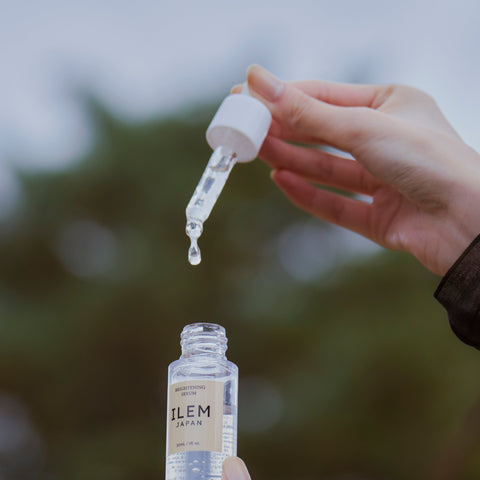
Compared to moisturizers that primarily work on the outermost skin barrier and uppermost skin layers, a face serum works on a deeper level with precision and efficacy. What sets serums apart is their ability to deliver active ingredients like hyaluronic acid, vitamin C, and retinol directly into the skin, thanks to their lightweight consistency and smaller molecular structure. This makes it possible for them to target the peskiest concerns.
Plus, a face serum offers targeted solutions. This means that each serum is specially formulated to work with a particular concern. As a result, you will find different kinds of serums in the market. Some of the most popular ones are:
- Anti-aging serum
- Hydrating serums
- Brightening serums
When looking for a face serum, you will find that there are some ingredients that are commonly found. For instance,
- Hyaluronic acid is the master of hydration.
- Vitamin C is good for its brightening and even toning properties.
- Marula Oil, known for its moisturizing and rejuvenating impact
- Green tea is good for its oil-regulating and acne-management advantages.
While all these are common across brands and products, ILEM JAPAN decided to include unique ingredients in their formulas. We're talking about skin prebiotics, Tangerine peel extracts, and Prickly pear extracts.
Why Add Serums to Your Routine? A Spectrum of Advantages
With so much being said, you must be wondering, "Okay, but why should I include it?" So, without further ado, here are the top 4 reasons why you should reserve a spot for serums in your routine, along with product examples!
Anti-Aging & Wrinkles
A face serum formulated to fight off signs of aging like wrinkles and fine lines contains active ingredients like retinol and peptides. Retinol, a form of vitamin A, stimulates collagen production and speeds up cell turnover, making your skin firmer and smoother.
Peptides, on the other hand, are like little messengers that tell your skin to produce more collagen, plumping up those fine lines and wrinkles from within. Plus, these serums contain hydrating ingredients which further improve your skin's appearance, making it youthful.
Hydration & Plumpness
Hydration is key to healthy, glowing skin, and serums are experts at keeping your skin moisturized and supple. One superstar ingredient found in many serums is hyaluronic acid. This magical molecule can hold up to 1000 times its weight in water, so when you apply a hyaluronic acid serum, it draws moisture deep into your skin, keeping it hydrated and plump.

Keeping this in mind, we formulated our Hydrating Serum. Besides hyaluronic acid, this face serum contains two other star ingredients: Marula Oil and Tangerine Peel Extract. Marula oil is an ingredient high in antioxidants, amino acids, and fatty acids– a combination that highly helps moisturize skin and protect it against pollutants.
On the other hand, Tangerine Peel Extract, which is high in Vitamin C, helps improve skin clarity. Plus, its ability to improve trans epidermal water loss (TEWL) reduces the loss of water from the skin.
Brightening & Dark Spots
Dark spots and pigmentation overshadow your skin's natural radiance. Truth be told, they can be very challenging to deal with since they've altered the skin's melanin (pigment). As a result, serums formulated for brightening and dark spots often contain ingredients that specifically target melanin production.
One such ingredient is vitamin C, a potent antioxidant known for its skin-brightening properties. It inhibits the enzyme tyrosinase, which plays a key role in melanin synthesis. Thus reducing the formation of dark spots and promoting a more even complexion. Additionally, vitamin C helps to fade existing hyperpigmentation by accelerating cell turnover and promoting the shedding of pigmented skin cells.

ILEM JAPAN has managed to distill all these benefits of Vitamin C in its Brightening Serum. We intentionally created it with nourishing ingredients like Vitamin C, Prickly Pear Extract, and Skin Prebiotics. And our goal with this serum? Correct pigmentation, enhance hydration, and smooth skin's texture.
Acne Control
Acne is a result of many factors. From our unhealthy lifestyle practices to poor diet choices, anything can instantly flare up acne. One of these factors is excessive oil production, which thankfully can be regulated by serums.
Serums designed for acne control often contain ingredients like salicylic acid, a beta hydroxy acid (BHA). It is popular for its ability to penetrate deep into the pores and dissolve excess oil and dead skin cells. By keeping the pores clear and preventing the buildup of oil and debris, salicylic acid reduces the risk of breakouts.
Inflammation is another experience that comes with acne. You will often find your skin turning red. Again, Niacinamide-infused serums are of great help here. Another common ingredient that you will find in serums targeting acne is tea tree oil.
But why? Some bacteria can proliferate within clogged pores, leading to breakouts. Here, antibacterial tea tree oil fights off these bacteria and reduces the risk of breakouts.
Barrier Repair
Your skin's outer barrier serves as the defense against the elements, protecting you from environmental factors and maintaining essential moisture levels. However, it may get compromised for many reasons.
This is why you need a serum infused with Ceramides, Fatty acids, Niacinamide, or antioxidants like Vitamin C. Each one of them holds a special property that addresses different aspects of the weakened outer barrier. Here's a quick overview for you.
The skin's outer barrier is primarily made of lipids, including ceramides, cholesterol, and fatty acids. Serums enriched with ceramides and fatty acids replenish these essential lipids, reinforcing the skin barrier and restoring its resilience.
Ceramides, especially, act as "mortar" between skin cells. As a result, they help to seal in moisture and prevent moisture loss. The result is a smoother, more supple complexion.
Now, there are also environmental factors like pollution and UV radiation that create free radicals that weaken the barrier.
Antioxidants, such as vitamins E and C, and green tea extract defend your skin against free radicals. For instance, Vitamin C brightens the complexion while supporting collagen synthesis. This fortifies the skin's resilience against external aggressors.
Finally, there's inflammation that may lead to redness, sensitivity, and discomfort. Serums formulated with anti-inflammatory ingredients, such as Niacinamide, chamomile extract, and licorice root extract, soothe irritation and promote skin healing.
For example, Niacinamide regulates sebum production, reduces redness, and boosts ceramide synthesis. Thereby, it strengthens the skin barrier and restores its balance.
Different Types of Serums Based On Skin Types
Finding the right serum for your skin type is as important as looking for the right ingredients. After all, both of them have to be in tandem for your skincare routine to work. As you know, not everyone has the same skin type. Thus, not everyone's needs are the same.
Broadly, there are five skin types, and the serum you will choose differs from one type to the other. Here's a quick brief for you, along with product recommendations!
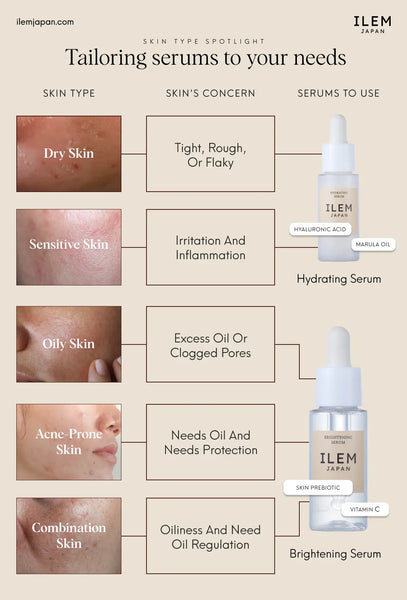
How To Apply Serum?: A Step-by-Step Guide to Serum Application
Now that you know all there is about a face serum and its skincare benefits, let's look at how you can actually include it in your routine. This brief step-by-step guide will tell you exactly what products you need to apply before and after a face serum. Plus, we will share some insightful layering tips for a face serum.
Step 1: Cleanse
Regardless of the skincare routine you look into, it will always start with cleansing. Why? Because you need clean, bare skin for any product to sink into the skin's layer and work its magic.

Opt for a Gentle Cleanser to cleanse your skin without stripping off its natural oils. If you are cleansing in the evening, you will need not one but two cleansers for double cleansing. One is an oil-based cleanser to melt away makeup and dirt. Two, a water-based cleanser to remove the residue. The goal is to thoroughly remove all dirt, oil, and makeup to prepare the skin for the next products.
Step 2: Toner
Toners help rebalance the skin's pH levels and remove any lingering traces of impurities. Opt for an alcohol-free toner with hydrating and soothing properties to prep your skin for serum absorption. Some of the toners worth checking out are the Balancing Toner, Clarifying Toner, and the Soothing Toner.
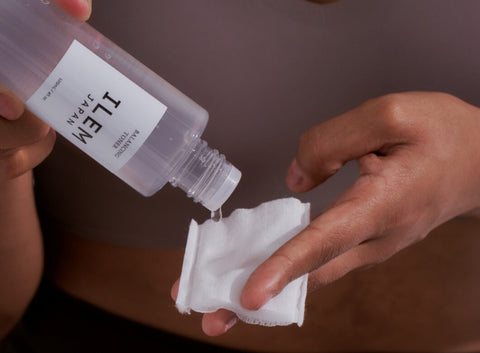
Now, how do you apply it? Apply the toner onto a cotton pad and gently sweep it across your face and neck. Of course, make sure you avoid the delicate eye area.
Step 3: Serum
Now, it's time to give your skin some extra boost. Take a pea-sized amount onto your fingertips and gently pat or massage it onto your skin. Start from the center of your face and work outward. Use upward motions to promote absorption and ensure even distribution.
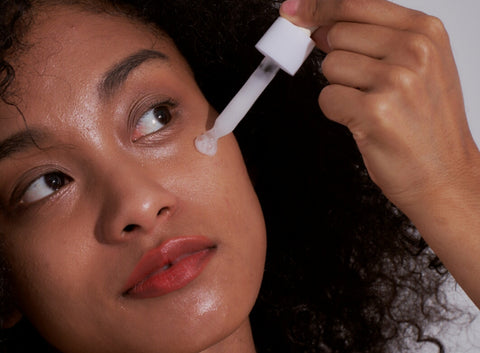
In the case of target solutions for dark spots and acne, focus the serum on specific areas and allow it to fully absorb into the skin before moving to the final step.
Step 4: Moisturizer
Next, lock in the skincare benefits of your serum. For this, you will need to follow up with a moisturizer after a minute or so. Again, it is important that you choose your moisturizer based on your skin type and needs.
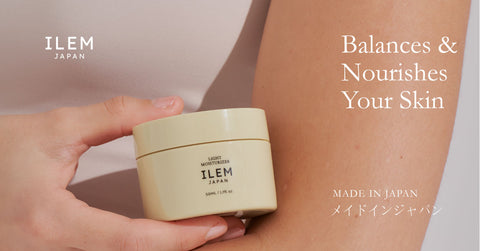
Like a serum, apply a dime-sized amount of moisturizer onto your fingertips and gently massage it onto your face and neck in upward motions until fully absorbed.
Step 5: Sunscreen
No skincare routine is complete without the essential step of sun protection, especially if it's a morning skincare routine. So, protect your skin from harmful UV rays by applying a broad-spectrum sunscreen with an SPF of 30 or higher, regardless of the weather or season.
Layering Tips
As the steps in your skincare routine increase, layering products may get difficult. This is especially true if your routine includes potent, active ingredients. So here are some layering tips to help you layer your serum well.
- Always go from thinnest to thickest. Apply serums with thinner consistencies, such as those containing hyaluronic acid or Niacinamide, before thicker serums or creams.
- Wait for a minute or so between two products. Give your skin ample time to absorb each product well to prevent pillings.
- Include a massaging technique to increase the absorption of the products. This will also give you better results.
Fact vs. Fiction: Clearing Up Doubts About Serums
Serums in the skin care industry have their fair share of appreciation and skepticism. So, it's important to separate the facts from fiction.
Myth: Serums are just a product of clever marketing hype.
Fact: While it's true that serums have gained popularity in recent years, their efficacy and benefits are backed by science. They contain high concentrations of active ingredients formulated to penetrate deeper into the skin, targeting specific concerns with precision. Their lightweight texture allows for better absorption. As a result, they deliver tangible results that go beyond mere marketing claims.
Myth: All serums cause irritation and sensitivity.
Fact: Serums contain a wide variety of potent ingredients. While some serums may cause irritation, it is important to remember that not all serums are created equal. Opting for serums formulated with gentle ingredients, avoiding harsh chemicals, and patch-testing new products can help minimize the risk of irritation. Additionally, it's important that you gradually introduce them into the routine.
Myth: Using serums with active ingredients leads to over-exfoliation.
Fact: Exfoliating serums containing AHAs or BHAs help promote cell turnover and reveal smoother, brighter skin. However, every product, when overused, does more harm than good. The same goes for face serums. Overuse or improper application of a face serum can indeed lead to over-exfoliation.
It's important to follow product instructions carefully, start with a lower frequency of use, and listen to your skin's cues. Furthermore, if you experience redness, stinging, or excessive dryness, it is wise to scale back or temporarily discontinue use to allow your skin to recover.
Myth: Skincare products, including serums, don't need to consider sustainability or ethical sourcing.
Truth be told, this myth totally depends on the brand we are talking about. Many serums, like ours, contain botanical extracts or natural ingredients sourced from plants or minerals. One way to make eco-conscious choices.is to look for certifications and transparency from brands regarding their sourcing practices.
Elevate Your Routine: Embracing the Power of Serums
That's all we have on serums for you. To quickly summarize, a face serum is a lightweight formula with active ingredients. It works on the deeper levels to offer targeted solutions, be it for dark spots, dryness, or acne.
Of course, you need to make sure that the serum you choose is compatible with your skin type and needs. Always look for specific ingredients and layer your serum correctly to make the most of it. Now, we understand that you may still have some questions in your mind. For this reason, we have tried to answer some of the common queries below:
What are the different types of face serums?
Broadly speaking, there can be many types of face serums depending on the concerns they address. Some of the common types include the following – hydrating serums, brightening serums, anti-aging face serums, acne-fighting serums, soothing serums, exfoliating serums, and face-firming and lifting serums.
What are the best facial serums for anti-aging?
The best facial serum for anti-aging is the ones formulated with retinol, peptides, and antioxidants. They target signs of aging like wrinkles, fine lines, and crowfeet by improving your skin's elasticity and fighting off free radicals.
Does face serum really work?
Yes, it does. Face serums are the easiest way to target challenging skin concerns like dark spots, pigmentation, and dryness. They rebuild your skin from within for a healthy appearance.
We hope we've answered all your questions about face serum. With so much being said, we just have another small request from you. That is to have patience. If you have chosen the best products for your skin type and are following a routine, give your skin some time. It will get better!










